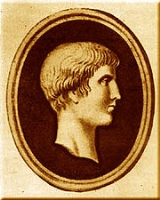
as Martial) (March 1, between 38 and 41 AD – between 102 and 104 AD), was a Latin poet from Hispania
(the Iberian Peninsula
) best known for his twelve books of Epigram
s, published in Rome
between AD 86 and 103, during the reigns of the emperors
Domitian
, Nerva
and Trajan
. In these short, witty poems he cheerfully satirises
city life and the scandalous activities of his acquaintances, and romanticises his provincial upbringing.
Lasciva est nobis pagina, vita proba.![]()
Sera nimis vita est crastina: vive hodie.![]()
Stop abusing my verses, or publish some of your own.![]()
You complain, friend Swift, of the length of my epigrams, but you yourself write nothing. Yours are shorter.![]()
I do not love thee, Sabidius, nor can I say why; this only I can say, I do not love thee.![]()
Conceal a flaw, and the world will imagine the worst.![]()
The bee enclosed and through the amber shownSeems buried in the juice which was his own.![]()
You ask what a nice girl will do? She won't give an inch, but she won't say no.![]()
Nullos esse deos, inane caelum Adfirmat Segius: probatque, quod se Factum, dum negat haec, videt beatum.![]()

